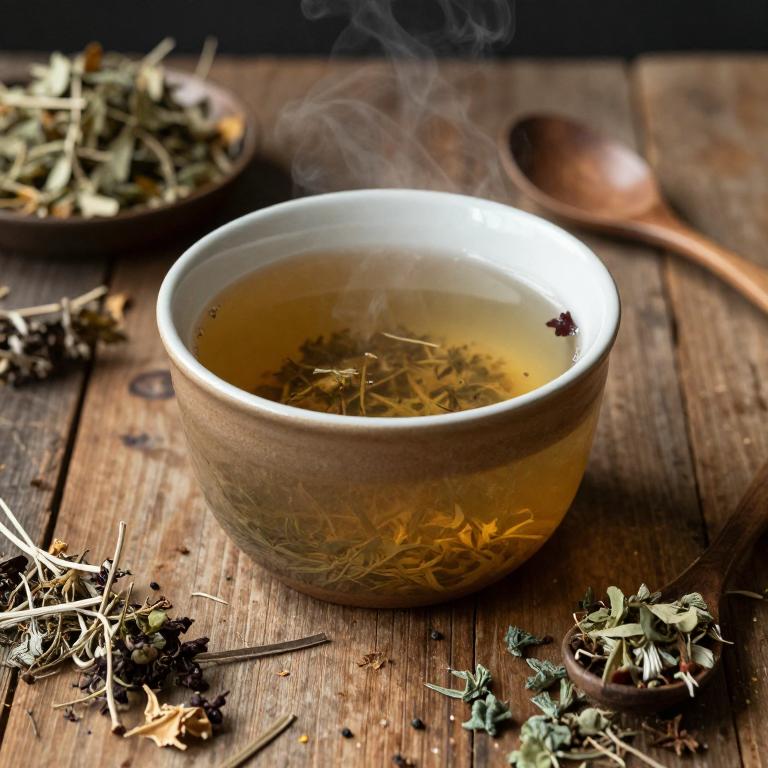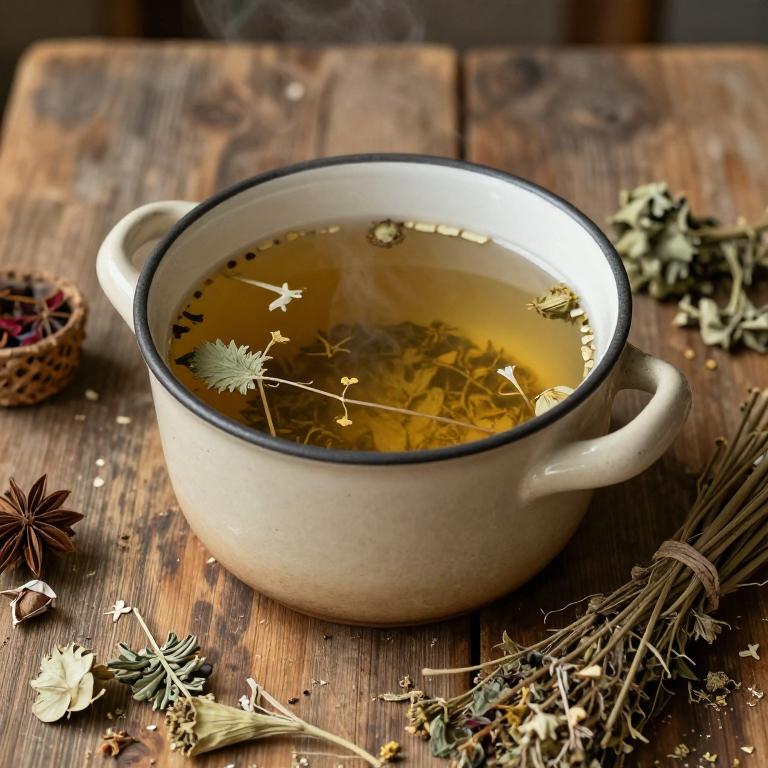10 Best Herbal Decoctions For Bronchitis

Herbal decoctions have been traditionally used to support the treatment of bronchitis by easing respiratory symptoms and promoting healing.
Common herbs such as eucalyptus, thyme, and licorice root are often included in these preparations due to their antimicrobial, anti-inflammatory, and expectorant properties. To prepare a decoction, the herbs are typically simmered in water for an extended period to extract their active compounds. These herbal remedies can help reduce coughing, clear mucus, and soothe irritated airways.
However, it is important to consult with a healthcare professional before using herbal decoctions, especially for chronic or severe cases of bronchitis.
Table of Contents
- 1. Eucalyptus (Eucalyptus globulus)
- 2. Thyme (Thymus vulgaris)
- 3. Peppermint (Mentha piperita)
- 4. Rosemary (Rosmarinus officinalis)
- 5. Ginger (Zingiber officinale)
- 6. Ceylon cinnamon (Cinnamomum verum)
- 7. Stinging nettle (Urtica dioica)
- 8. Yarrow (Achillea millefolium)
- 9. Salvia (Salvia officinalis)
- 10. Parsley (Petroselinum crispum)
1. Eucalyptus (Eucalyptus globulus)

Eucalyptus globulus, commonly known as the Australian eucalyptus, is widely used in herbal decoctions for its potential respiratory benefits.
The leaves of this plant contain essential oils, including cineole, which may help to reduce inflammation and clear mucus from the airways. When prepared as a decoction, eucalyptus globulus can be consumed as a tea to soothe symptoms of bronchitis such as coughing and congestion. However, it is important to use it in moderation and consult with a healthcare provider, especially for individuals with asthma or other respiratory conditions.
While some studies suggest it may provide relief, more research is needed to fully understand its efficacy and safety in treating bronchitis.
2. Thyme (Thymus vulgaris)

Thymus vulgaris, commonly known as thyme, has been traditionally used in herbal medicine for its potential benefits in treating respiratory conditions like bronchitis.
The essential oils and volatile compounds in thyme, particularly thymol and carvacrol, possess antimicrobial and anti-inflammatory properties that may help reduce infection and inflammation in the airways. Herbal decoctions made from thyme leaves and flowers are often prepared by simmering the plant material in water to extract its active constituents. These decoctions can be consumed as a tea to soothe coughing and ease breathing in individuals with bronchitis.
However, it is important to consult a healthcare professional before using thyme-based remedies, especially for those with allergies or who are taking other medications.
3. Peppermint (Mentha piperita)

Mentha piperita, commonly known as peppermint, is often used in herbal decoctions to support respiratory health, including the treatment of bronchitis.
The essential oils in peppermint, particularly menthol, have expectorant properties that help loosen mucus and ease coughing. When prepared as a decoction, peppermint can soothe irritated airways and reduce inflammation in the bronchial tubes. It is typically combined with other herbs like thyme or eucalyptus to enhance its effectiveness.
However, it is important to consult a healthcare professional before using peppermint decoctions, especially for chronic or severe bronchitis cases.
4. Rosemary (Rosmarinus officinalis)

Rosmarinus officinalis, commonly known as rosemary, has been traditionally used in herbal medicine for its potential therapeutic properties.
Herbal decoctions made from rosemary leaves are often prepared by simmering the dried leaves in water to extract their active compounds, such as rosmarinic acid and essential oils. These decoctions are believed to help alleviate symptoms of bronchitis by reducing inflammation and easing respiratory congestion. The antimicrobial and antioxidant properties of rosemary may support the body's natural defenses against respiratory infections.
However, while rosemary decoctions may offer supportive benefits, they should not replace conventional medical treatments for bronchitis, and individuals should consult with healthcare professionals before use.
5. Ginger (Zingiber officinale)

Zingiber officinale, commonly known as ginger, has been traditionally used in herbal medicine for its anti-inflammatory and bronchodilatory properties.
Herbal decoctions made from fresh or dried ginger root are often prepared by simmering the root in water for several minutes to extract its active compounds, such as gingerol and shogaol. These decoctions are believed to help alleviate symptoms of bronchitis by reducing airway inflammation and easing respiratory congestion. Some studies suggest that ginger may support immune function and reduce mucus production, making it a potential complementary therapy for chronic bronchitis.
However, while ginger is generally safe, it should be used with caution in individuals taking blood-thinning medications or those with gastrointestinal sensitivities.
6. Ceylon cinnamon (Cinnamomum verum)

Cinnamomum verum, also known as true cinnamon, has been traditionally used in herbal medicine for its anti-inflammatory and antimicrobial properties.
When prepared as a herbal decoction, it involves simmering the bark in water to extract its active compounds, such as cinnamaldehyde and essential oils. This decoction is often used to alleviate symptoms of bronchitis by helping to reduce mucus production and soothe irritated airways. Its warming effects may also help to ease respiratory discomfort and promote easier breathing.
However, while some studies suggest potential benefits, it is important to consult a healthcare professional before using cinnamon decoctions as a treatment for bronchitis, especially for individuals with allergies or existing health conditions.
7. Stinging nettle (Urtica dioica)

Urtica dioica, commonly known as stinging nettle, has been traditionally used in herbal medicine for its anti-inflammatory and bronchodilatory properties.
Herbal decoctions made from the leaves and stems of Urtica dioica are often prepared by simmering the dried plant material in water for several minutes. These decoctions are believed to help alleviate symptoms of bronchitis by reducing mucus production and soothing irritated airways. The high concentration of minerals such as potassium, magnesium, and iron in stinging nettle may contribute to its therapeutic effects.
However, it is important to consult a healthcare professional before using Urtica dioica decoctions, especially for individuals with allergies or those taking other medications.
8. Yarrow (Achillea millefolium)

Achillea millefolium, commonly known as yarrow, has been traditionally used in herbal medicine for its anti-inflammatory and expectorant properties.
When prepared as a decoction, it may help alleviate symptoms of bronchitis by reducing bronchial irritation and promoting the expulsion of mucus. The active compounds in yarrow, such as flavonoids and essential oils, contribute to its bronchodilatory and antispasmodic effects. To prepare the decoction, dried yarrow herb is typically boiled in water for about 15-20 minutes, then strained and consumed several times a day.
While yarrow may offer supportive relief for bronchitis, it is advisable to consult a healthcare professional before using it, especially for prolonged periods or in combination with other medications.
9. Salvia (Salvia officinalis)

Salvia officinalis, commonly known as sage, has been traditionally used in herbal medicine for its potential respiratory benefits, including the treatment of bronchitis.
Herbal decoctions made from the leaves of salvia officinalis are often prepared by simmering the dried plant material in water to extract its active compounds, such as flavonoids and essential oils. These decoctions are believed to help reduce inflammation in the airways and alleviate symptoms like coughing and mucus production. Sage's antimicrobial and expectorant properties may support the body's natural healing processes in cases of bronchitis.
However, it is important to consult with a healthcare professional before using sage decoctions, especially for individuals with underlying health conditions or those taking medications.
10. Parsley (Petroselinum crispum)

Petroselinum crispum, commonly known as parsley, has been traditionally used in herbal medicine for its potential therapeutic effects on respiratory conditions such as bronchitis.
The leaves of this plant contain essential oils, including apiol and myristicin, which possess antimicrobial and anti-inflammatory properties that may help reduce bronchial inflammation and ease mucus production. Herbal decoctions made from fresh or dried parsley leaves are often prepared by simmering them in water to extract these beneficial compounds. These decoctions are believed to support expectoration and soothe irritated airways, making them a popular remedy in some traditional healing practices.
However, while parsley may offer supportive benefits, it is advisable to consult a healthcare professional before using it as a treatment for bronchitis, especially for individuals with existing health conditions or those taking medications.